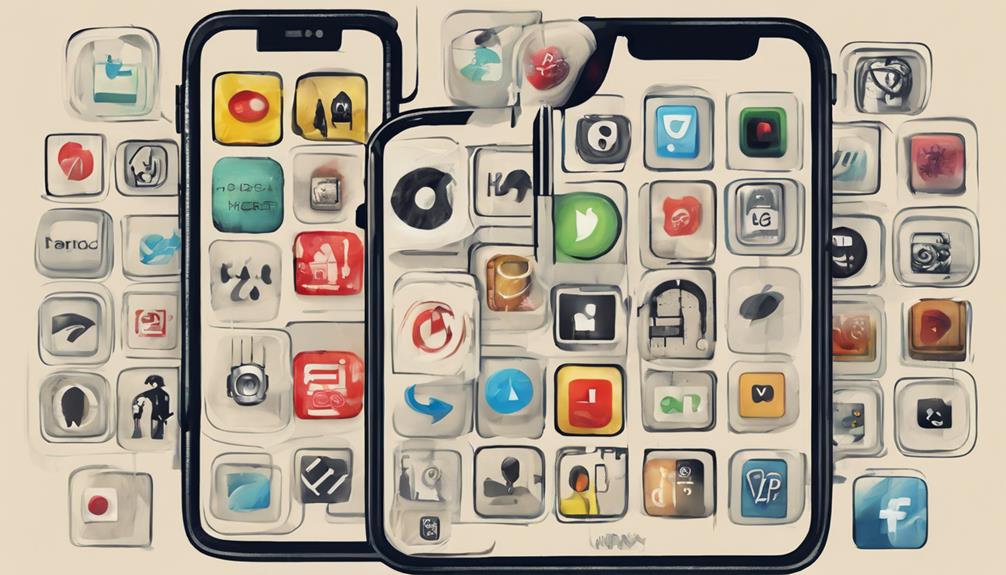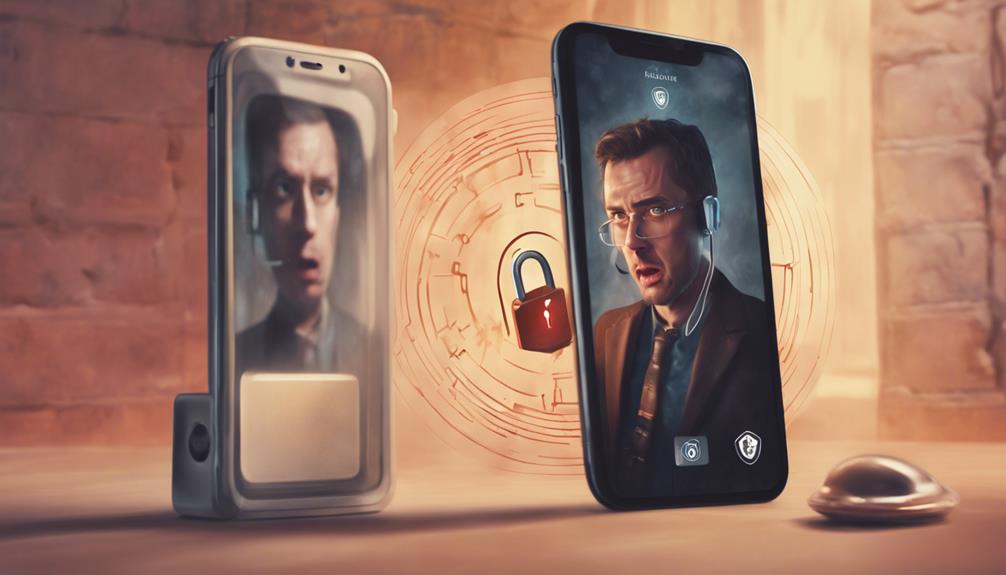FaceTime is designed with robust security measures like end-to-end encryption and AES256 encryption, ensuring a safe environment for audio and video interactions. Despite these safeguards, past incidents highlight potential privacy concerns and vulnerabilities. Users should remain vigilant by recognizing suspicious apps, checking for jailbreaking signs, ensuring a secure internet connection, and enabling two-step verification. Regular updates, strong passwords, and cautious behavior further strengthen the security of FaceTime calls. Understanding and implementing these practices enhance protection against hackers and unauthorized access. Staying informed about threats and maintaining secure habits are key in safeguarding FaceTime communications.
Key Takeaways
- FaceTime is secure with end-to-end encryption.
- Regular updates and vigilance enhance security.
- Avoid jailbreaking to prevent vulnerabilities.
- Use secure networks and strong passwords.
- Enable two-step verification for added protection.
FaceTime Security Features
FaceTime guarantees secure communication by utilizing robust end-to-end encryption protocols to safeguard audio and video data exchanged during calls. Apple's implementation of end-to-end encryption guarantees that even the company cannot decrypt FaceTime data, providing a secure environment that protects users from potential hackers.
The establishment of session keys through the Secure Real-time Transport Protocol (SRTP) enhances the security of media channels, while group FaceTime calls benefit from the same level of end-to-end encryption among all participants.
Additionally, FaceTime leverages AES256 encryption in Counter Mode for packet encryption and HMAC-SHA1 for packet authentication, further bolstering its security features. These measures collectively contribute to making FaceTime a reliable and secure platform for users to engage in audio and video communications without compromising their privacy or falling victim to malicious cyber threats.
FaceTime Privacy Concerns

Amidst the robust security features of FaceTime, the discussion now shifts towards examining potential privacy concerns associated with the platform. While FaceTime boasts end-to-end encryption to guarantee secure communication, there have been privacy issues that have raised eyebrows.
In the past, a FaceTime bug allowed callers to listen in on recipients before they answered the call, highlighting potential vulnerabilities in the platform's security protocols. This bug brought to light the risks of spyware exploiting such loopholes, potentially compromising user privacy.
Although FaceTime does not store call content and anonymizes service usage data, concerns remain regarding the handling of user information. Even though Apple takes measures to secure FaceTime communications, users must remain vigilant to safeguard their privacy.
FaceTime Eavesdropping Incident

In early 2019, a significant FaceTime eavesdropping incident occurred due to a bug that allowed unauthorized users to listen in on calls.
This incident raised valid privacy concerns among users and highlighted the importance of robust security measures in communication platforms.
Apple's swift response in addressing the vulnerability and implementing fixes underscored the critical need for continuous vigilance and prompt software updates to enhance the security of FaceTime calls.
Privacy Concerns
Following the Group FaceTime bug incident in early 2019, concerns surrounding privacy and security were heightened regarding the popular video calling service. The ability for unauthorized users to eavesdrop on FaceTime calls raised significant privacy concerns among users of Apple devices, prompting questions about the safety of using the platform.
The incident revealed vulnerabilities in the end-to-end encryption that FaceTime claims to provide, allowing hackers to access audio and video from the recipient's device without consent. Users were left questioning the integrity of their conversations and the extent to which their privacy was compromised.
Apple's quick response in addressing the bug by temporarily disabling the Group FaceTime feature and releasing a fix in February 2019 aimed to restore confidence in the platform's security measures. Moving forward, users remain cautious about the safety of their FaceTime conversations and the adequacy of the platform's privacy safeguards.
Security Measures
In the aftermath of the FaceTime eavesdropping incident, heightened attention has been directed towards the security measures employed by the platform. The Group FaceTime bug, which allowed unauthorized access to calls, raised significant privacy concerns among users. Apple, the company behind FaceTime, swiftly addressed the issue by fixing the bug and temporarily disabling the Group FaceTime feature until a solution was implemented.
One of the key aspects of FaceTime security is its end-to-end encryption, which guarantees that only the sender and receiver can access the content of their communication. This encryption measure is vital in safeguarding the privacy of users and preventing unauthorized access to conversations.
Following the incident, users were advised to update their devices to the latest software version to mitigate potential security risks.
Recognizing Suspicious Apps

One key aspect of maintaining the security of your device is the ability to recognize suspicious apps that may pose a threat to your privacy and data. Spyware and malicious apps are designed to infiltrate your device and compromise your sensitive information. Jailbreaking, a process that removes restrictions on iOS devices, can make your device vulnerable to hacking and increase the risk of downloading harmful apps.
Utilizing anti-spyware apps like Clario AntiSpy can help detect and remove these suspicious applications, enhancing your device's security. Regularly scanning your device for any unfamiliar or potentially harmful apps is essential to safeguarding your data.
Additionally, staying vigilant for any unusual behavior on your device, which could indicate a security breach, is vital in maintaining a secure digital environment.
Checking for Jailbreaking Signs

To safeguard the security of your iPhone, it is important to be vigilant in checking for signs of jailbreaking that may compromise your device's integrity.
Jailbreaking, the process of removing software restrictions imposed by Apple, can open your device to unauthorized access and spyware threats, potentially putting your FaceTime calls at risk.
Signs of jailbreaking include the presence of unfamiliar apps, unauthorized software installations, or unusual behavior such as sudden battery drain, crashes, or erratic performance.
Keep an eye out for the Cydia app icon, commonly associated with jailbroken devices, or look for SSH or Terminal apps that are often used in the jailbreaking process.
Spyware can exploit jailbroken iPhones to eavesdrop on FaceTime calls without your knowledge.
Regularly inspect your device for any unknown apps, changes in settings, or suspicious activities to detect potential jailbreaking and prevent unauthorized access to your sensitive information.
Using Anti-Spyware Apps

Utilizing anti-spyware apps provides an additional layer of security to safeguard your FaceTime calls from potential hacking attempts. One such tool, like Clario Anti Spy, specializes in spyware detection to protect against hackers trying to tap into your conversations. These apps scan devices thoroughly, aiming to eliminate malicious software that could compromise your privacy during FaceTime calls. By regularly using anti-spyware apps like Clario Anti Spy, you can proactively scan your device for any signs of unauthorized access or suspicious activity, ensuring a safer communication environment. These tools are designed to detect and remove spyware, enhancing the security measures against potential threats to your FaceTime calls.
| Feature | Description |
|---|---|
| Spyware Detection | Clario Anti Spy excels in detecting and removing spyware. |
| Protect Against Hackers | Enhances security measures to safeguard against hacking attempts. |
| Scan Devices | Regularly scans devices for unauthorized access and spyware. |
| Eliminate Malicious Software | Aims to eliminate any malicious software targeting FaceTime calls. |
Safeguarding Against Suspicious Calls

Safeguarding against suspicious calls is essential to maintaining the security and privacy of your FaceTime conversations. FaceTime's robust encryption protocols play a vital role in ensuring that calls remain secure from potential hackers. By converting data into indecipherable code through end-to-end encryption, Apple effectively prevents unauthorized access to audio and video content during FaceTime calls. This encryption also safeguards against interception, as Apple's encryption methods make it impossible for unauthorized parties to decrypt the transmitted data.
Furthermore, being vigilant for signs of spyware on your devices is paramount in preventing hacking attempts. Regularly updating your iOS, managing app permissions, and staying informed about potential threats are key steps in safeguarding your privacy during FaceTime calls.
With Apple anonymizing FaceTime logs to maintain data privacy between devices, users can feel confident that their conversations are protected against malicious actors seeking to compromise the security of their calls.
Secure Internet Connection for FaceTime

Maintaining a secure internet connection is essential for ensuring the protection of your FaceTime conversations against potential hacking risks. When using FaceTime, especially in public Wi-Fi networks, the vulnerability to hackers increases greatly. To enhance the safety of your FaceTime communications, it is vital to connect to secure Wi-Fi networks with strong passwords. Additionally, incorporating a Virtual Private Network (VPN) can add an extra layer of security to your FaceTime calls, encrypting the data exchanged during the communication process.
To summarize the importance of a secure internet connection for FaceTime, consider the following table:
| Aspect | Importance | Action |
|---|---|---|
| Public Wi-Fi Networks | High risk of hacking attempts during FaceTime calls | Avoid using public Wi-Fi for calls |
| Secure Wi-Fi Networks | Enhances safety of FaceTime communications | Connect to networks with strong passwords |
| Virtual Private Networks (VPNs) | Adds an additional layer of security by encrypting data during FaceTime calls | Consider using a VPN for added protection |
Remember to avoid sharing personal information or clicking on suspicious links to prevent hacking attempts while engaging in FaceTime conversations.
Enabling Two-Step Verification

Enabling two-step verification for your Apple ID is an essential step in strengthening your account security. By adding this extra layer of protection, you can safeguard your personal information and prevent unauthorized access to your FaceTime calls.
To enable two-step verification, simply navigate to your Apple ID settings and follow the prompts to set it up securely.
Strengthening Account Security
To enhance the security of your Apple ID account, consider implementing two-step verification as an additional safeguard against unauthorized access. Two-step verification adds an extra layer of protection by requiring both your password and a verification code sent to a trusted device for account access.
This feature is essential in preventing unauthorized entry, even if someone gains knowledge of your password. Setting up two-step verification in your Apple ID account settings is a proactive step towards securing your FaceTime and other Apple services. It is a recommended security measure that provides peace of mind knowing that your account is better protected from potential breaches.
Adding Extra Layer
How does implementing two-step verification enhance the security of your Apple ID account?
Enabling two-step verification on your Apple devices adds an extra security layer by requiring a code in addition to your password for account access. This code is sent to a trusted device or phone number that you have previously set up.
By incorporating two-step verification, you introduce an additional step that helps prevent unauthorized access to your account, even if your password is compromised. This added security measure not only safeguards your Apple ID but also enhances the protection of your FaceTime calls.
With two-step verification in place, you can have more confidence in the privacy and security of your conversations over FaceTime, knowing that unauthorized individuals are less likely to gain access to your account and intercept your calls.
Protecting Personal Information
Implementing two-step verification on your Apple ID account greatly enhances the protection of your personal information. This security measure adds an extra layer of defense, requiring a verification code along with your password for access, making it notably harder for hackers to breach your account.
Here are three key advantages of enabling two-step verification:
- Enhanced Security: Two-step verification helps prevent unauthorized access to your Apple ID, ensuring that even if hackers manage to acquire your password, they would still need the verification code to gain entry.
- Personal Information Protection: By implementing two-step verification, you significantly reduce the risk of hackers gaining access to sensitive personal information stored in your Apple ID account, such as payment details, contact information, and iCloud data.
- Easy Setup: Setting up two-step verification can be done conveniently in your Apple ID account settings, providing a straightforward process to bolster the security of your account and safeguard your personal data effectively.
Importance of Strong Passwords

Ensuring the security of your FaceTime account starts with creating strong passwords that are difficult for hackers to crack. Important passwords play a vital role in safeguarding your personal information from unauthorized access.
By incorporating a mix of letters, numbers, and special characters, you can enhance the complexity of your password, making it more resilient against hacking attempts. It is important to steer clear of using easily guessable information such as birthdays or common words, as these can weaken the strength of your password.
Regularly updating your password is another effective measure to prevent hackers from gaining unauthorized entry into your FaceTime account. Additionally, utilizing a password manager can aid in generating and storing complex passwords securely, adding an extra layer of protection to your account.
Frequently Asked Questions
How Secure Is Apple Facetime?
Apple FaceTime provides robust security features with end-to-end encryption, safeguarding calls from unauthorized access. Apple's dedication to privacy guarantees data protection and confidentiality, maintaining secure communication channels for users seeking a trustworthy platform for video calling.
Can a Facetime Call Be Recorded?
While FaceTime calls are end-to-end encrypted, ensuring privacy and protection, the technical feasibility of recording a FaceTime call is complex and highly unlikely due to the robust encryption measures implemented by Apple.
Is Facetime Bad for Your Phone?
Facetime, when used responsibly and with necessary precautions, is generally safe for your phone. However, vigilance against potential security threats, such as downloading unknown apps or clicking suspicious links, and ensuring device updates, is vital for maintaining phone security.
Can You Get Spam Facetime Calls?
Receiving spam FaceTime calls remains an uncommon event, owing to Apple's stringent security protocols. The end-to-end encryption and robust security features in FaceTime deter hackers, making it challenging for them to exploit the platform for spamming endeavors.
Conclusion
To sum up, while FaceTime does have security features in place to protect users from hackers, there have been instances of privacy breaches and eavesdropping incidents. It is important for users to be vigilant and take precautions such as recognizing suspicious apps, checking for signs of jailbreaking, and safeguarding against suspicious calls.
Utilizing a secure internet connection, enabling two-step verification, and using strong passwords are essential steps to enhance the security of FaceTime calls.









